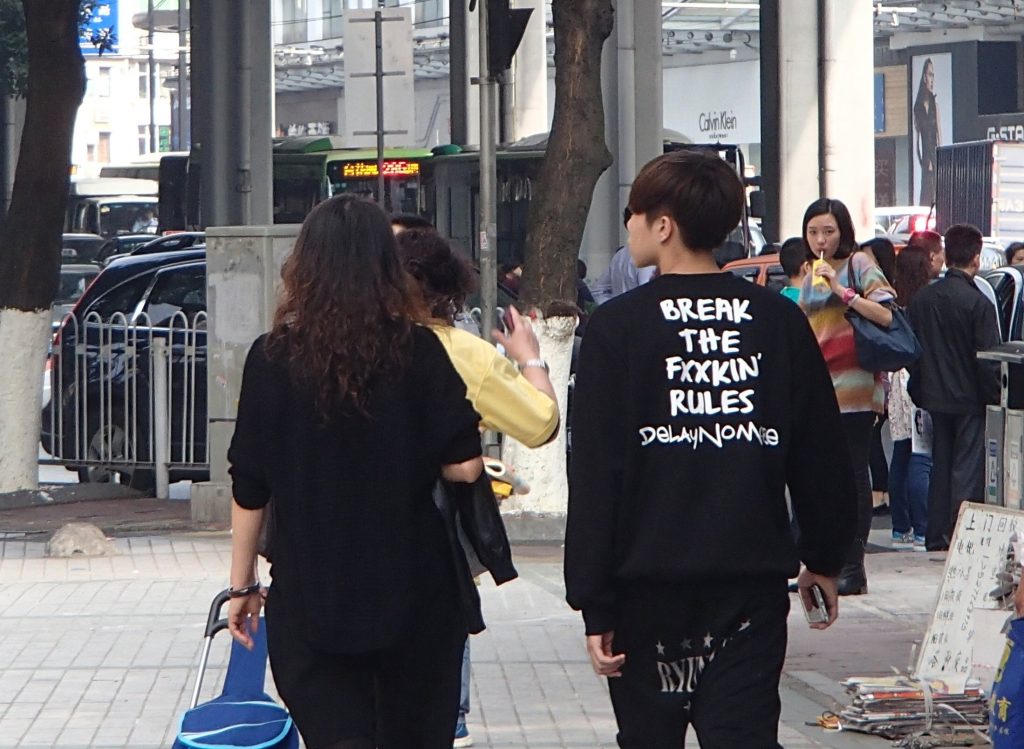Western Directness (直接) verses Chinese Ambiguity (暧昧) in Communication
From a viewpoint as a Westerner who has traveled between both China and Australia over the years, there is one major cultural difference which most polarizes the Western and Eastern approaches to manners.
It came in China, Guangzhou, when after a few months of repressed tension, my girlfriend finally swore at me.
The point of difference was about why I never watch Chinese news in China.
I replied, “I don’t want to see good news stories about China and bad news stories about foreigners and the rest of the world. I want to see real news about China.”
Then she swore at me.
I exclaimed, “Whoa! That is the first time you swore at me!” It was building up too.
She tried to excuse her behavior, but on the contrary, I encouraged her by saying, “You sounded like an Australian just then!”
Communication – The Australian Way (直接)
I told her, “That is what Australian people do, and the Australian government do the same thing too, because they are always telling the Chinese government what they think about them, and now they are in big trouble politically with China.”
She exclaimed, “Yeah. So, even Australian politicians are like that?”
I said, “Yeah, we are all very direct (直接). I will tell you the reason why.”
“…The reason Australian people do that, is… pretend you went to the toilet and some toilet paper is stuck on your ass. If it were a Chinese person, in this culture, because of face (面子) they would not tell you. They would just let you walk around with toilet paper stuck on your ass.”
“…But an Australian person would say, ‘Hey mate, you have some tissue paper stuck on your ass. I know it is embarrassing for both of us, but I am going to tell you about it, so that you know to be careful next time and check for yourself.'”
“…Australian people are very direct (直接) because they kind of want to teach other people a lesson so that the person who receives the lesson could improve themselves.”
She said, “I don’t like it when people teach me all the time.”
I said, “It is not about teaching per se. In Australia, we want to see other people improve. If you can see that someone is doing something the wrong way, and they can benefit from your advice, then you tell them.”
“…So, Australian people are very direct with other people. They are very blunt, because down the track, that person will learn from that experience. They would think next time, ‘Let me check my ass. Is there any toilet paper here this time? There is not.’ And so they learn from that experience.”
“…Despite the awkward confrontation, they actually had a positive benefit from having someone else telling them what they think. It gives people closure. That is why we do it.”
“..Australians are trying to teach you in order to help you not make future mistakes.”
Communication – The Chinese Way (暧昧)
I digressed, “Because I know Chinese people. Chinese people if you meet them on the street and they don’t like you, and you ask them why, they would keep it all a secret, on the down-low, and will not tell you their opinion, because that is the Chinese way.”
She said, “I will do the same thing, because I don’t want to offend people. Sometimes I have friends on my WeChat (微信). I don’t like them, but I still will remain friends with them, just because it is more polite to do that.”
I said, “Australian people wouldn’t do that. Why would you make friends with people you do not like? It makes sense if you have to live with them, so, because of living, then you have to be nice to them and tolerate them. You have to be nice to your family too, but you don’t have to be nice to strangers.”
“…So, that is the difference between my culture and your culture. If we come across somebody that we don’t like in Australia, we just tell them straight away, ‘we don’t like you’. And then we tell them why. It just saves everyone a lot of trouble.”

Chinese, In The Roots Of Confucius (孔子)
She said, “But we don’t do that in our culture.”
“…With you, or with people in general, I am careful about what I say. I am not very direct. That is the Chinese way. But you are very direct. You say whatever you want to do.”
She then explained Confucius (孔子). “Confucius wrote many principles to follow that Chinese still follow to this day. One of those rules is to be nice to other people, or 礼貌.”
She explained that towards a foreigner or anyone else, they are taught to cultivate courtesy. In essence, this means that Chinese people can come across as insincere in Western society, a society which values honesty and truth, rather than face (面子).
Western Adaptation To Eastern Cultural Practices
Often in China, when I make new friends, they will befriend me out of politeness. Then, when you do try to be a friend, and invite them out to drinks – which is a very Western practice – the excuses will come quickly. And if you try to figure out the actual reasons, the Chinese responses will become very ambiguous (暧昧), yet remain polite.
You could try to reason with them to elicit a logical reason, or otherwise burn their apartment down with a blow torch, but either way, they will remain ambiguous (暧昧) and probably still remain your distant friends.
I have come to understand that, along with all the other cultural differences that make lasting friendships with Chinese more challenging compared to friendships with Westerners, one just needs to curb their Western enthusiasm, show patience, and to not incorrectly assume that willingness to exchange contact details will mean the same thing in Chinese society as it does in Western society.
In China, throwaway friendliness often is just a form of being polite.
Given that Chinese society values networking (关系网) however, with time, these obscure connections – with trust – can transform into fruitful business opportunities.


Diary Of A Mad Chaos is a daily diary written from March 1996 until today, of which individual books and book series have been created, namely “The Lost Years” an exploration of young, entwined love, the “Wubao In China (猎艳奇缘)” book series which provides an extensive comparative analysis of the cultural differences between Eastern and Western societies, and the book titled “Foreigner (华人)” an exploration of race relations in Australia.










